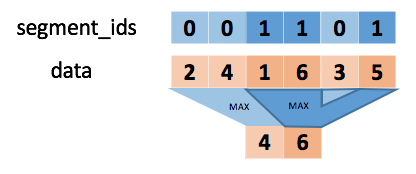mindspore.ops.UnsortedSegmentMax
- class mindspore.ops.UnsortedSegmentMax[source]
Computes the maximum along segments of a tensor.
The following figure shows the calculation process of UnsortedSegmentMax:
 \[\text { output }_i=\text{max}_{j \ldots} \text { data }[j \ldots]\]
\[\text { output }_i=\text{max}_{j \ldots} \text { data }[j \ldots]\]where \(max\) over tuples \(j...\) such that \(segment\_ids[j...] == i\).
Note
If the segment_id i is absent in the segment_ids, then output[i] will be filled with the minimum value of the input_x’s type.
- Inputs:
input_x (Tensor) - The shape is \((x_1, x_2, ..., x_R)\). The data type must be float16, float32 or int32.
segment_ids (Tensor) - A 1-D tensor whose shape is \((x_1)\), the value must be non-negative tensor. The data type must be int32.
num_segments (int) - The value specifies the number of distinct segment_ids.
- Outputs:
Tensor, set the number of num_segments as N, the shape is \((N, x_2, ..., x_R)\).
- Raises
TypeError – If num_segments is not an int.
ValueError – If length of shape of segment_ids is not equal to 1.
- Supported Platforms:
AscendGPU
Examples
>>> # case 1: Only have two num_segments, where is 0 and 1, and segment_ids=[0, 1, 1] >>> # num_segments = 2 indicates that there are two types of segment_id, >>> # the first number '0' in [0, 1, 1] indicates input_x[0], >>> # the second number '1' in [0, 1, 1] indicates input_x[1], >>> # the third number '1' in [0, 1, 1] indicates input_x[2], >>> # input_x[0], which is [1, 2, 3] will not be compared to other segment_id. >>> # Only the same segment_id will be compared. >>> input_x = Tensor(np.array([[1, 2, 3], [4, 5, 6], [4, 2, 1]]).astype(np.float32)) >>> segment_ids = Tensor(np.array([0, 1, 1]).astype(np.int32)) >>> num_segments = 2 >>> unsorted_segment_max = ops.UnsortedSegmentMax() >>> output = unsorted_segment_max(input_x, segment_ids, num_segments) >>> print(output) [[1. 2. 3.] [4. 5. 6.]] >>> >>> # case 2: The segment_ids=[0, 0, 1, 1]. >>> # [1, 2, 3] will compare with [4, 2, 0], >>> # and [4, 5, 6] will compare with [4, 2, 1]. >>> input_x = Tensor(np.array([[1, 2, 3], [4, 2, 0], [4, 5, 6], [4, 2, 1]]).astype(np.float32)) >>> segment_ids = Tensor(np.array([0, 0, 1, 1]).astype(np.int32)) >>> num_segments = 2 >>> unsorted_segment_max = ops.UnsortedSegmentMax() >>> output = unsorted_segment_max(input_x, segment_ids, num_segments) >>> print(input_x.shape) (4, 3) >>> print(output) [[4. 2. 3.] [4. 5. 6.]] >>> # case 3: If the input_x have three dimensions even more, what will happen? >>> # The shape of input_x is (2, 4, 3), >>> # and the length of segment_ids should be the same as the first dimension of input_x. >>> # Because the segment_ids are different, input_x[0] will not be compared to input_x[1]. >>> input_x = Tensor(np.array([[[1, 2, 3], [4, 2, 0], [4, 5, 6], [4, 2, 1]], >>> [[1, 2, 3], [4, 2, 0], [4, 5, 6], [4, 2, 1]]]).astype(np.float32)) >>> segment_ids = Tensor(np.array([0, 1]).astype(np.int32)) >>> num_segments = 2 >>> unsorted_segment_max = ops.UnsortedSegmentMax() >>> output = unsorted_segment_max(input_x, segment_ids, num_segments) >>> print(input_x.shape) (2, 4, 3) >>> print(output) [[[1. 2. 3.] [4. 2. 0.] [4. 5. 6.] [4. 2. 1.]] [[1. 2. 3.] [4. 2. 0.] [4. 5. 6.] [4. 2. 1.]]] >>> # case 4: It has the same input with the 3rd case. >>> # Because num_segments is equal to 2, there are two segment_ids, but currently only one 0 is used. >>> # the segment_id i is absent in the segment_ids, then output[i] will be filled with >>> # the smallest possible value of the input_x's type. >>> segment_ids = Tensor(np.array([0, 0]).astype(np.int32)) >>> output = unsorted_segment_max(input_x, segment_ids, num_segments) >>> print(output) [[[ 1.0000000e+00 2.0000000e+00 3.0000000e+00] [ 4.0000000e+00 2.0000000e+00 0.0000000e+00] [ 4.0000000e+00 5.0000000e+00 6.0000000e+00] [ 4.0000000e+00 2.0000000e+00 1.0000000e+00]] [[-3.4028235e+38 -3.4028235e+38 -3.4028235e+38] [-3.4028235e+38 -3.4028235e+38 -3.4028235e+38] [-3.4028235e+38 -3.4028235e+38 -3.4028235e+38] [-3.4028235e+38 -3.4028235e+38 -3.4028235e+38]]]